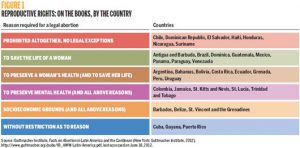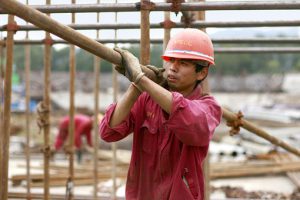
Peace, Women and Security: A Latin American Perspective
The United Nations Security Council has promoted a gender focus in peacekeeping operations, including the protection of civilians, since the adoption of Resolution 1325 (RES1325) in 2000. The logic is simple: involving women in peace negotiations and reconstruction efforts helps ensure a more equitable and stable society following conflict. Since December 2000, Latin American participation … Read more

The Public Debate Over Private Lives
Every day, women across Latin America are terminating their pregnancies under illegal and unsafe circumstances. The number of unsafe abortions—which represent about 95 percent of the total—grew from 3.9 million in 2003 to 4.2 million in 2008, with the annual abortion rate holding steady during that period, at about 32 abortions per 1,000 women between … Read more
Diversity Equals Dollars
For many people, gender diversity is important because it removes barriers that have historically prevented women from taking their rightful places in the corridors of power. But there’s also a specific business case to be made: including more women in the corporate setting will help meet customers’ needs, enrich understanding of the pulse of the … Read more

The Uphill Battle of Justice Reform
The strength and quality of democracy depend on how well judiciaries perform and function. In Latin America, after more than 20 years of judicial reforms, there have been some notable achievements. But there is a long way to go before judiciaries can adequately carry out their responsibilities to resolve conflicts, define and interpret rights and laws, and provide the … Read more
Increasing Women’s Representation in Politics
Dilma Rousseff. Laura Chinchilla. Cristina Fernández de Kirchner. Michelle Bachelet. The political successes of these women should not divert our attention from the sizeable gender imbalance in politics that exists across the region. Slightly more than half of all Latin American citizens are female, but women occupy only one of every seven seats in legislatures—and … Read more
The Next Step in Improving Equity: Tax Reform
In the last decade, inequality has decreased in the majority of countries in Latin America. This historic shift was largely the result of unprecedented, steady economic growth and increased public spending that targeted the most vulnerable populations—mainly through conditional cash transfer programs. Nevertheless, income inequality is still unacceptably high. With a Gini coefficient of 0.52, … Read more

The Digital Divide and Social Inclusion
In a world where technology has delivered changes unimaginable even 10 years ago, as well as created sharp divides, it’s only logical that many would see computer proficiency as a fundamental learning skill. Today, quality education requires broad access to information and content, a medium for communication, and tools for analyzing data—all things that computers … Read more
Race and Ethnicity by the Numbers
*Watch an AQ Q&A interview with Judith Morrison. Despite growing recognition that racial and ethnic groups across the Americas are disproportionately poor, government interventions that address their needs have been inadequate. Yet if the region’s current economic growth is going to be sustained, it will require policy tools that address the exclusion of these groups … Read more

Generation Ni/Ni: Latin America’s Lost Youth
The youth unemployment rate today in Latin America and the Caribbean stands at a remarkable 15 percent. These 8 million unemployed are part of what may be called a global “lost generation” of young people at risk of social exclusion—all of whom lack opportunities, resources and access to formal labor markets. In 2011, 75 million … Read more

LGBT Rights in the Americas
A transformation, some would even say a revolution, is taking place in our understanding of democracy. Citizens and nations are increasingly recognizing that freedom and equality under the law requires protecting the rights, status and expression of lesbian, gay, bisexual, and transgender (LGBT) people. What was a taboo subject 20 years ago is today open … Read more

Chinese (Un)official Development Aid
China, unlike members of the Organization for Economic Cooperation and Development (OECD), considers foreign aid a “state secret,” so the total amount of aid to Latin America—estimated in the hundreds of billions of dollars annually—remains unconfirmed. But it’s clear that such aid forms an important part of China’s increased economic clout in the region. Ngaire … Read more

Exporting Corruption
In 2008, when I was a Fulbright professor at Nankai University in Tianjin, China, the international school my children attended hired a local contractor to build a new classroom wing. As the building reached completion, the relationship went sour: the construction did not meet the criteria originally agreed upon. As the parties began to fight … Read more

China’s Global Rise
China has taken a renewed interest in the five-sixths of the world that is still developing—the area famously christened the “Third World” by Jawaharlal Nehru at the dawn of the Cold War. But China’s identification with the emerging world is by no means new.1 And the interest is not just rhetorical: it is borne out … Read more

Dilma’s Education Dilemma
More than anything, Brazil’s continued economic growth depends on a well-educated workforce. While Brazil is one of the three fastest-improving countries in terms of student test scores among the 65 countries that take part in the Program for International Student Assessment (PISA) tests, educational reform is still a top priority. Despite the advances, Brazil suffers … Read more
The Decline in Inequality in Latin America: Policies, Politics or Luck?
Latin America has been basking in good news lately. High growth, combined with an unusual resilience to the global financial crisis, has contrasted sharply with events in Europe and the United States. Even the countries hardest hit by the crisis have managed quite well. Another piece of good news has received less attention. Income inequality … Read more

